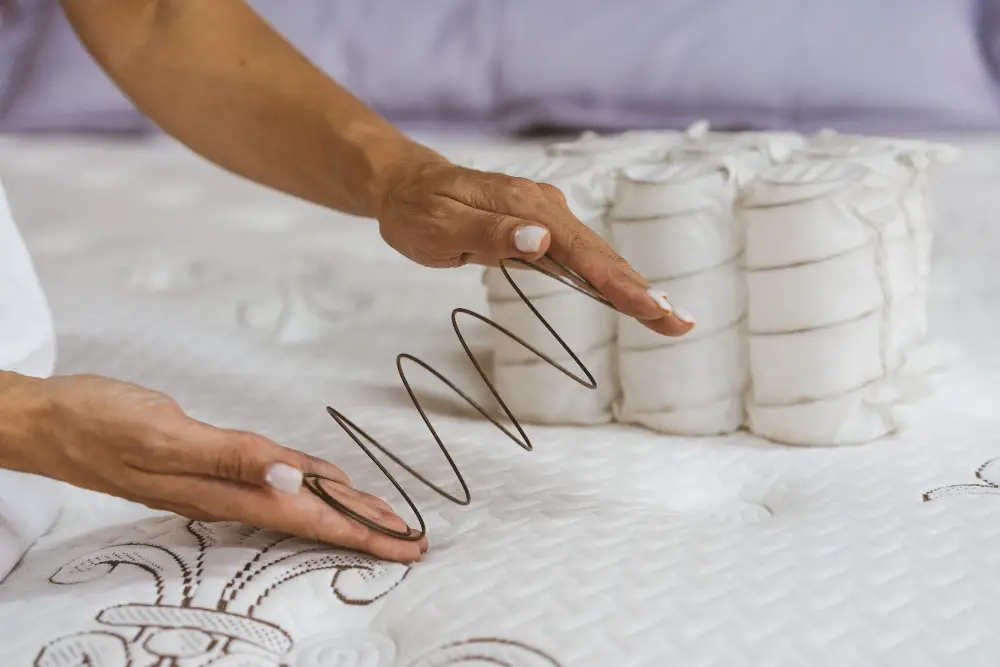Last updated on
Discover the importance of understanding weight limits for couches and how it impacts their durability, comfort, and overall functionality.
Have you ever snuggled up on your couch with a bowl of popcorn and your favorite movie, only to wonder if the couch can handle your weight? Or maybe you’re considering purchasing a new couch but are unsure if it will hold up for years to come. Well, you’re not alone! Many people have questions about the weight limits of their furniture, and specifically their beloved couches.
In this article, we’ll explore whether or not couches have weight limits and what factors may affect them. So grab a seat (on your sturdy sofa) and let’s dive in!
Key takeaways:
- Couches have weight limits determined by construction and materials.
- Materials like solid wood or metal can support more weight.
- Frame construction and cushion support systems affect weight capacity.
- Weight distribution and body position on the couch matter.
- Exceeding weight limits can cause damage and void warranties.
Table of Contents
Understanding Couch Weight Limits

When it comes to understanding couch weight limits, there are a few key factors to consider. First and foremost, it’s important to note that all couches have some sort of weight limit.
This is because the materials used in construction can only support so much weight before they begin to break down or wear out.
The exact weight limit of a particular couch will depend on several different factors, including the type of frame construction used (such as solid wood versus particleboard), the types of springs and cushion support systems employed, and even how evenly distributed your bodyweight is when sitting on the sofa.
It’s also worth noting that not all couches are created equal when it comes to their weight capacity. Some models may be designed specifically for heavier individuals or families with children who like jumping around on furniture.
Ultimately, understanding your couch’s weight limit is crucial for ensuring its longevity and safety over time.
Materials Affecting Weight Capacity

For example, a couch made of solid wood or metal will generally have a higher weight limit than one made of particleboard or plastic. The type and quality of upholstery material can also affect how much weight the couch can hold.
Leather and high-quality fabrics are typically more durable than cheaper options like vinyl or polyester blends. This is because they are less likely to stretch out over time, which could cause sagging in areas where people sit frequently.
When shopping for a new couch, it’s essential to consider both the frame construction and upholstery materials when evaluating its potential weight capacity. A well-made sofa with sturdy materials should be able to support more significant weights without compromising comfort or durability.
Frame Construction

It’s essential to choose a couch with a sturdy and durable frame construction, especially if you plan on using it frequently or have multiple people sitting on it at once.
Most high-quality couches are made from hardwood frames, such as oak or maple. These woods are known for their strength and durability, making them ideal for furniture construction.
However, some manufacturers may use cheaper materials like particleboard or plywood in their frames to cut costs.
When shopping for a new sofa, be sure to check the quality of its frame construction by looking at the type of wood used and how it’s joined together. A well-constructed sofa will have joints that are reinforced with dowels or corner blocks rather than just glue alone.
Types of Couch Springs

There are several types of springs commonly used in couches, including sinuous, coil, and webbing. Sinuous or serpentine springs are S-shaped wires that run from front to back along the frame and provide support for the cushions.
Coil or pocketed coils consist of individual metal coils wrapped in fabric pockets that are then attached to the frame with clips or ties. Webbing is made up of interwoven strips of elastic material stretched across the seat and back frames.
While all three types can provide adequate support for different weights, some may be more durable than others over time depending on usage patterns and quality standards.
Cushion Support Systems

The most common types of cushion support systems are webbing, sinuous springs, and coil springs.
Webbing is made from durable materials such as nylon or polyester and provides excellent support for lightweight people. However, it may not be suitable for heavier individuals as it can sag over time.
Sinuous spring systems consist of S-shaped wires that run horizontally across the frame. They provide more significant durability than webbing but may still not be strong enough to hold up against heavyweights.
Coil spring systems are considered the best option when it comes to supporting heavyweight individuals on a couch. These cushions have individually wrapped coils that offer superior comfort and long-lasting durability even with frequent use by big-bodied persons.
Weight Distribution Factors

The distribution of that weight is also an important factor to consider. For example, if you have a sectional sofa with a chaise lounge on one end and several people sitting on the other end, there may be more pressure placed on one section than another.
Where you place your bodyweight matters too. Sitting in the center of your couch will distribute your weight evenly across its frame and springs while lounging or sleeping at either end could put extra stress on those areas.
It’s essential to keep these factors in mind when considering how much weight your couch can handle because unevenly distributed weights could cause damage over time or even lead to accidents like tipping over.
How To Tell The Weight Limit Of Your Couch

The first place to look is in the manufacturer’s instructions or on their website. Most reputable furniture companies will provide this information for each piece they sell.
Another way to determine weight limits is by checking the tags or labels attached to your couch. These may be located underneath cushions, on the bottom of frames, or even sewn into fabric covers.
It’s important not only to know what your couch can handle but also what it cannot handle. Exceeding weight limits can cause damage and reduce its lifespan significantly.
Keep in mind that while some sofas have specific weight capacities listed by manufacturers, others do not have any official guidelines available at all – especially older models that predate modern safety standards and regulations.
What Happens If I Exceed The Weight Limit Of A Couch?

The most common problem is that the couch may start to sag or even break under pressure. This can cause discomfort and make it difficult for people to sit on the couch comfortably.
Exceeding weight limits could also damage other parts of your furniture such as springs, cushions or frame.
In some cases where a person exceeds their sofa’s weight capacity by a significant amount, they might experience an accident like falling through broken frames or collapsing seats which could result in serious injuries.
It’s important not only for comfort but also safety reasons that you adhere strictly to your sofa’s recommended maximum load capacity.
The Importance of Weight Limits for Couch Durability

It plays an essential role in the durability and longevity of your furniture. A couch that is overloaded can cause damage to its frame, springs, cushions, and fabric over time.
This damage may lead to sagging seats or even complete structural failure.
Understanding the weight limit of your couch will help you make informed decisions about how much weight it can handle safely without causing any harm or discomfort for you or others using it.
It’s important to note that exceeding the recommended weight capacity could also void any warranty on your sofa if one exists. So always check with the manufacturer before purchasing a new piece of furniture if you’re unsure about its maximum load-bearing capacity.
High-Capacity Couches for Big and Heavy People

Fortunately, there are high-capacity couches designed to accommodate larger individuals. These sofas typically have reinforced frames and cushions with extra support to handle more weight.
When shopping for a high-capacity couch, it’s essential to consider the weight limit of the sofa as well as its overall construction. Look for sturdy materials such as hardwood or metal frames that can withstand heavier loads without bending or breaking.
Some manufacturers offer custom options for their high-capacity sofas so that you can choose specific features like wider seats or deeper cushions tailored to your needs.
How Much Weight Should a Standard Sectional Sofa Hold?

As a general rule of thumb, most standard sectional sofas should be able to hold between 300-500 pounds per seat. This means that if you have a three-seat sofa, it should be able to support up to 1500 pounds in total weight.
It’s important to note that this weight limit is not just for people sitting on the couch but also includes any additional items placed on top such as blankets or pillows. Exceeding these limits can cause damage over time and may even lead to structural failure.
If you’re unsure about your sectional sofa’s weight capacity or are looking for a higher-capacity option due to specific needs (such as accommodating larger individuals), consider reaching out directly with manufacturers or retailers who specialize in heavy-duty furniture options.
How to Buy a Sectional Sofa Based On Its Weight Capacity?

This is especially true if you have a larger family or frequently entertain guests. To ensure that your sectional can handle the weight of multiple people, look for models with sturdy frames made from materials like hardwood or metal.
Pay attention to the cushion support system and types of springs used in each section. Some couches may use weaker materials that won’t hold up over time or under heavier weights.
It’s also worth noting that some manufacturers offer high-capacity options specifically designed for big and heavy individuals. These models often feature reinforced frames and extra-thick cushions to provide additional support.
Does the Weight of a Couch Matter?

The weight limit of a couch is determined by the materials used in its construction and the design of its frame. A heavier person sitting on a couch that has not been designed to support their weight can cause damage over time, leading to sagging cushions or even broken frames.
If you frequently have guests over or enjoy entertaining large groups of people in your home, it’s important to consider the combined weight capacity of your furniture. Overloading a sofa with too much weight can lead to discomfort for those seated and potential damage.
It’s also worth noting that while some manufacturers may advertise their products as being able to hold more than others based on specific features such as reinforced frames or high-density foam cushions – ultimately every piece will have limits.
Do All Couches Have the Same Weight Limit?

The weight limit of a couch can vary depending on several factors such as the materials used in construction, frame design, and cushion support systems. For example, a sectional sofa may have a higher weight capacity than an armchair due to its larger size and sturdier frame.
It’s important to note that even within the same type of furniture category (e.g., sectional sofas), different models from different manufacturers may have varying weight capacities. This is why it’s crucial to check with the manufacturer or retailer for specific information regarding your chosen piece of furniture.
Some custom-made couches can be designed with higher-than-average weight limits based on individual needs or preferences. However, these options often come at an additional cost.
No two couches are exactly alike when it comes to their maximum load-bearing capacity.
How Much Weight Can an Average Couch Hold?

The average weight capacity for most standard couches ranges from 250 to 750 pounds. However, this can vary depending on several factors such as the materials used in construction and design.
For instance, a leather sofa may have a higher weight capacity than one made with fabric upholstery due to its sturdier frame and denser cushioning. Similarly, sectional sofas tend to have higher weight limits compared to traditional two or three-seater sofas because they are designed with more robust frames that can support additional seating areas.
It’s important not only for comfort but also safety reasons that you do not exceed your couch’s recommended maximum load-bearing capacity. Overloading your furniture could lead to structural damage or even collapse which could cause injury or property damage.
Can Some Couches Hold More Than Their Weight Capacity?

Some couches may be able to hold more weight than their stated capacity suggests. This is because manufacturers often test their products with a safety margin in mind, meaning that they intentionally set lower limits than what the couch can actually handle.
That being said, it’s not recommended to exceed any weight limits on your furniture as doing so could still cause damage over time and potentially void any warranties you have on your purchase. It’s always best practice to follow manufacturer guidelines and use common sense when it comes to how much weight you put on your sofa.
If you’re concerned about finding a sturdy option for heavier individuals or families with children who like jumping around on furniture, consider looking into high-capacity sofas specifically designed for these purposes. These types of sofas are built with extra reinforcement and support systems that allow them to withstand greater amounts of pressure without breaking down quickly.
Custom Couch Options

Many furniture manufacturers offer customization services that allow you to choose the materials, frame construction, cushion support systems and other features of your couch. This means that you can work with a professional to create a sofa that is specifically designed to meet your needs.
Customization also allows for more flexibility when it comes to weight capacity. You can discuss your concerns with the manufacturer or designer and they will be able to recommend materials or design elements that will increase durability without sacrificing comfort.
When considering custom options, keep in mind that this may come at an additional cost compared to pre-made models. However, investing in a high-quality customized couch could save money over time by reducing wear-and-tear caused by exceeding weight limits on standard models.
Warranties and Weight Limits

Most furniture manufacturers offer warranties on their products, but these warranties may vary depending on the weight limit of your couch. Some companies may not honor their warranty if you exceed the recommended weight capacity.
It’s crucial to read through your manufacturer’s warranty before making a purchase so that you know what is covered and what isn’t. If there are any questions about whether or not exceeding the weight limit will void your warranty, contact customer service for clarification.
Some companies offer extended warranties specifically for heavy-duty use or larger individuals who require higher-weight capacity furniture. These types of warranties can provide peace of mind knowing that if something were to happen due to excessive use or wear-and-tear beyond normal usage conditions; repairs would be covered under this type of policy.
Understanding both a couch’s weight limits and its accompanying manufacturer’s warranty is critical when selecting new furniture pieces for your home décor needs.
Safety Precautions

Overloading a couch can lead to structural damage, which may cause injury or even collapse. To avoid this, always follow the manufacturer’s guidelines for weight capacity and distribute weight evenly across the seating area.
Be mindful of how you use your furniture. Avoid jumping on or standing on sofas as these actions can put undue stress on their frames and springs.
If you have concerns about exceeding a couch’s recommended weight limit due to medical conditions or other factors outside of your control, consider investing in high-capacity furniture designed specifically for larger individuals.
Iconic Couch Designs

These designs have stood the test of time and continue to be popular today. One such example is the Chesterfield sofa, which originated in England in the 18th century and features a distinctive tufted leather design with rolled arms and backrests.
Another classic design is the Mid-Century Modern sofa, characterized by clean lines, tapered legs, and low profiles.
In recent years there has been a resurgence of interest in these iconic couch designs as people seek out unique pieces for their homes that reflect their personal style while also providing comfort. Many furniture manufacturers offer modern takes on these classic styles or even create custom versions tailored to individual preferences.
When considering an iconic couch design for your home it’s important to keep weight limits in mind as some older models may not be able to support heavier weights due to outdated construction methods or materials used at that time.
Whether you’re looking for a statement piece or simply want something comfortable yet stylish for your living room, exploring different types of sofas can help you find just what you need!
FAQ
How much weight can a sofa bed hold?
A sofa bed can typically hold a weight capacity of around 250-500 pounds, accommodating most homeowners’ needs.
What does weight capacity mean on furniture?
Weight capacity on furniture refers to the maximum static load it can support, which is the weight of an item or person when settled and no longer moving.
Can 2 people carry a sofa?
Yes, two people can carry a lighter sofa or loveseat, but larger sectionals may require four people for proper lifting.
How much weight can a 3 seater sofa hold?
A typical 3-seater sofa can hold approximately 340kg of weight, but this may vary depending on the sofa’s shape or style.
What factors determine the weight capacity of a couch?
Weight capacity of a couch is determined by factors such as the materials used, frame strength, quality of construction, and supportive design.
Are there specific materials used in constructing furniture that can support higher weight limits?
Yes, specific materials such as hardwood, steel, and reinforced aluminum are commonly used in constructing furniture to support higher weight limits.
How can one ensure they choose the right sofa for their weight requirements and overall durability?
To ensure choosing the right sofa for weight requirements and overall durability, one should consider factors such as its frame, materials, cushions, and warranty, while checking for weight limits and reading reviews from customers with similar weight needs.





